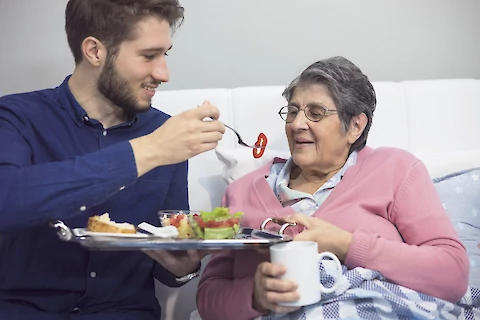
Caring for seniors comes with a unique set of challenges and rewards. One concern that caregivers often grapple with is changes in dietary habits. Understanding the distinction between disordered eating and eating difficulties can be pivotal in providing quality care and ensuring the overall health of our aging loved ones.
Disordered Eating in Seniors
Disordered eating refers to problematic eating behaviors and attitudes towards food and body image. In seniors, it can manifest as extreme dieting, binging, or an unhealthy preoccupation with food and body weight, often associated with psychological distress. This is distinct from a diagnosed eating disorder. However, it can lead to severe health complications like malnutrition, weakened immunity, and decreased bone density if left unaddressed.
Older Adults and Eating Difficulties
Eating difficulties in seniors typically relate to physical challenges that affect their ability to consume food. These may be due to dental problems, changes in taste or smell, or difficulties swallowing. In some older adults, this may be due to their dislike of prescribed dietary restrictions for managing chronic illnesses. Seniors facing these issues could experience inadequate nutrition, leading to fatigue, weight loss, and reduced physical strength.
Distinguishing Between Disordered Eating and Eating Difficulties
The main differences between disordered eating and eating difficulties are the cause and manifestation. Disordered eating is often emotionally driven. Eating difficulties, on the other hand, typically result from physical issues.
Accurately distinguishing between these two scenarios is crucial because the interventions differ significantly. Seniors with disordered eating often require psychological support and therapeutic interventions. Older adults with eating difficulties may require dietary modifications or physical treatments like dental care or swallowing therapy. Early identification and the right interventions can effectively manage both situations, improving the senior's physical health and emotional well-being.
How Caregivers Can Help
As caregivers, your insight and observations are invaluable in spotting changes in seniors' eating behaviors. If you notice sudden weight changes, unusual eating patterns, or increased anxiety around meals, these could be signs of disordered eating. Physical difficulties during meal times, repeated refusal of certain foods, or complaints about taste changes could signal eating difficulties.
Always approach conversations around disordered eating and eating difficulties with sensitivity. Express your observations without judgment, showing understanding and concern. Coordinate with healthcare professionals for proper intervention. Whether it's connecting with a nutritionist to modify meal plans or a therapist to work through emotional distress, your active involvement can make a real difference.
Connect With Senior Helpers Salem, OR
Caring for seniors is a fulfilling responsibility that requires continuous learning and adaptability. Distinguishing between disordered eating and eating difficulties is crucial for supporting your senior loved one's health and providing them with the best care.
If you're seeking professional support in caring for an aging loved one in Salem, Corvallis, Dallas, Albany, or Keizer, Senior Helpers Salem, OR, can help. Our dedicated team is committed to providing professional in-home care solutions for older adults so they can safely and comfortably age in place. Contact us to learn more about the services we offer.